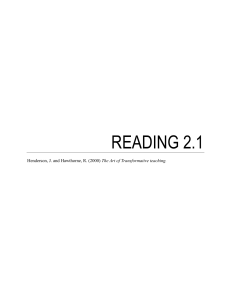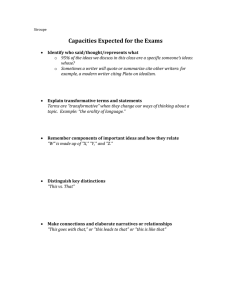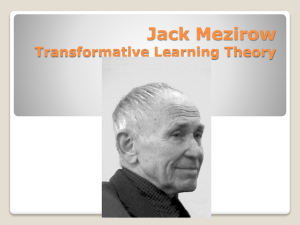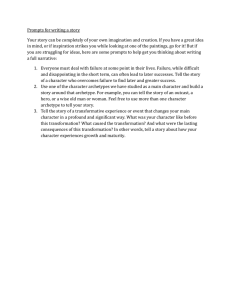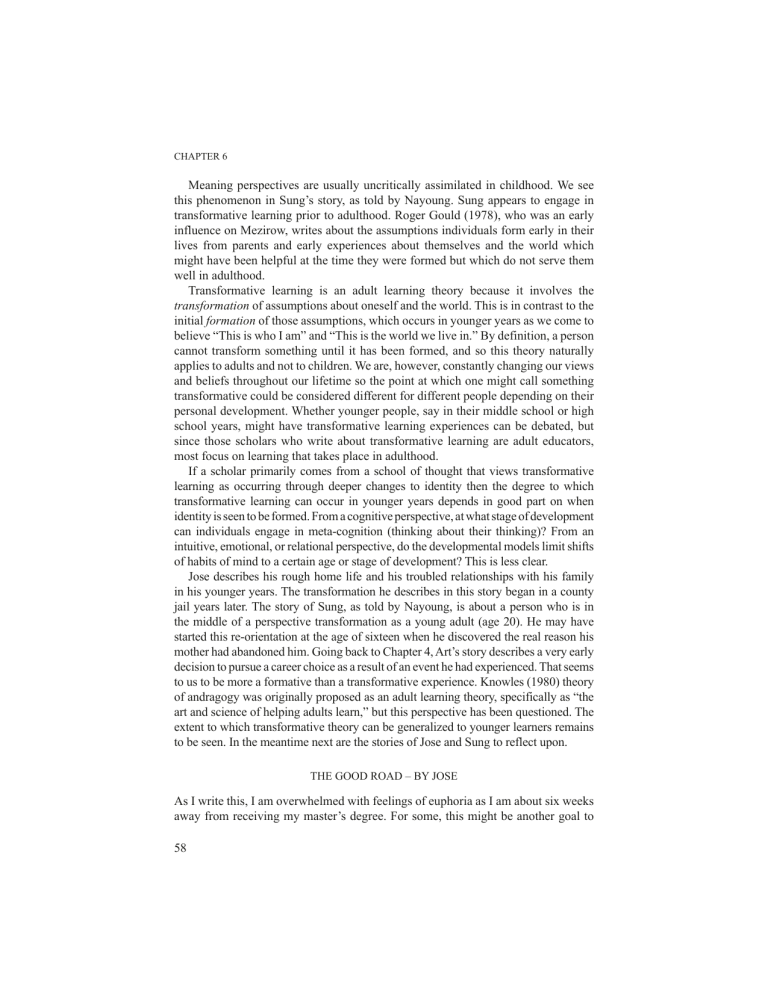
CHAPTER 6 Meaning perspectives are usually uncritically assimilated in childhood. We see this phenomenon in Sung’s story, as told by Nayoung. Sung appears to engage in transformative learning prior to adulthood. Roger Gould (1978), who was an early influence on Mezirow, writes about the assumptions individuals form early in their lives from parents and early experiences about themselves and the world which might have been helpful at the time they were formed but which do not serve them well in adulthood. Transformative learning is an adult learning theory because it involves the transformation of assumptions about oneself and the world. This is in contrast to the initial formation of those assumptions, which occurs in younger years as we come to believe “This is who I am” and “This is the world we live in.” By definition, a person cannot transform something until it has been formed, and so this theory naturally applies to adults and not to children. We are, however, constantly changing our views and beliefs throughout our lifetime so the point at which one might call something transformative could be considered different for different people depending on their personal development. Whether younger people, say in their middle school or high school years, might have transformative learning experiences can be debated, but since those scholars who write about transformative learning are adult educators, most focus on learning that takes place in adulthood. If a scholar primarily comes from a school of thought that views transformative learning as occurring through deeper changes to identity then the degree to which transformative learning can occur in younger years depends in good part on when identity is seen to be formed. From a cognitive perspective, at what stage of development can individuals engage in meta-cognition (thinking about their thinking)? From an intuitive, emotional, or relational perspective, do the developmental models limit shifts of habits of mind to a certain age or stage of development? This is less clear. Jose describes his rough home life and his troubled relationships with his family in his younger years. The transformation he describes in this story began in a county jail years later. The story of Sung, as told by Nayoung, is about a person who is in the middle of a perspective transformation as a young adult (age 20). He may have started this re-orientation at the age of sixteen when he discovered the real reason his mother had abandoned him. Going back to Chapter 4, Art’s story describes a very early decision to pursue a career choice as a result of an event he had experienced. That seems to us to be more a formative than a transformative experience. Knowles (1980) theory of andragogy was originally proposed as an adult learning theory, specifically as “the art and science of helping adults learn,” but this perspective has been questioned. The extent to which transformative theory can be generalized to younger learners remains to be seen. In the meantime next are the stories of Jose and Sung to reflect upon. THE GOOD ROAD – BY JOSE As I write this, I am overwhelmed with feelings of euphoria as I am about six weeks away from receiving my master’s degree. For some, this might be another goal to 58 TRANSFORMATION THROUGH EDUCATIONAL EXPERIENCES check off their list, but for me, it’s all still a dream that I expect to wake up from. However, as I look back, my life wasn’t always this great. My name is Jose. I am a 38-year-old Hispanic male who was born right outside of San Francisco, California. I grew up in a ghetto located in the industrial city of South San Francisco. My parents who had emigrated from Mexico were very poor. As a result, I lived in a garage that was about 350 square-feet in area, which I shared with my parents and four siblings. Life in the box, which is what I called our home, was rough. My younger sister was born with a lung condition that required her to be confined to a crib wrapped with a plastic contraption and constant oxygen circulating to it. My father who was an alcoholic, and who was having an extramarital affair, spent his days at work and his nights and weekends away from home, either at the bar or with his mistress. My sister’s condition and my father’s infidelity consumed my mother’s attention. The majority of the time, my mother was very edgy. She would say some really mean things, and tell us to get out of the house. Since my house was one of two homes on the block, located in between a 76 gas station and a warehouse at the foot of a hill, there was not much to do. I would often go to a park located a couple of blocks away in a gang-infested neighborhood. The park was always littered with beer bottles, graffiti, and large groups of boys, but what drew my attention to this place was the unity and family-like relationships that the boys displayed, something that I yearned for. I would often stand close by and watch them hug, laugh, play, and joke around with each other, wishing that I could be part of the group. I had not experienced this sort of bond. The only thing that I was used to was being scolded at by my parents, which made me feel like I was the root of their problems. The school that was closest to my house had closed down, so I was forced to go to the good school on the other side of town. Both of my parents only have a second grade education, so they were not able to provide me with educational support. As a result, school was very difficult for me. Everyone around me seemed so much smarter than I was, and this really made me feel incompetent and worthless. In addition, I was bullied a lot in school. I always tried to be transparent in the classroom, but the teacher would still call on me to answer. I always dreaded this not only because I did not know the answer, but because the students would almost always laugh at me. During recess, kids would mock me and call me stupid. There were even a few times when I was walking home that a couple of kids ran over to me and kicked me for no reason. I really hated going to school. When I turned 12 years old, we moved to a one-bedroom house right in the heart of the ghetto, half a block from the park. Since I knew all of the boys, most of them gang-members, that hung around there, we quickly developed a family-like bond. Finally, I found the acceptance and protection that I had been missing in both my home and school life. Unfortunately, that bond also brought me many issues. That same year, I witnessed and often participated in constant violence. I even witnessed a stabbing and a shooting, which only intensified over the years. I also started experimenting with drugs. By the time I was 17, I had dropped out of school, was a 59 CHAPTER 6 full-fledged tattooed gang-member and a full-blown drug addict. My experiences, both as a gang-member and a drug addict, caused me a life of grief. I spent a total of 15 years in-and-out of jail, finally landing in San Quentin State Penitentiary. Upon being released from prison, I tried to get my act together to impress my parole officer so that I could be released from parole sooner. I enrolled in a community college and pursued a certificate in dental assisting. I also obtained work, washing cars at a family-owned car rental agency, and I met my wife who later became my anchor. I did really well in school, which was a revelation. In addition, I was promoted at work to a rental agent position. My parole officer was really impressed, and, after 18 months, he terminated my parole. I kept a 4.0 GPA in my dental program and was a few months away from receiving my certificate, but when it was time to become certified, I did not pass the background check required. As a result, I did not receive a certificate. This was really difficult for me to swallow. Within months, I was also notified by my company that it was selling its business to the competition, and that I would no longer have a job. I soon found myself in a state of depression. It wasn’t long before my drug addiction resumed, and I began running the streets again. During this time, my wife was really supportive and she sat back waiting for me to snap out of it. She believed in me more than I believed in myself. My drug binge lasted for about 7 years before I landed in jail again. I was looking at a 12-year sentence. I bailed out of jail and enrolled in a drug rehabilitation program in an attempt to convince the judge to reduce my sentence. I didn’t really care about what the drug rehabilitation program had to offer. My whole intention was to avoid going back to prison and to persuade the judge to give me another chance. I did an outstanding job at the drug program and even stayed there longer than I had to as a mentor to newcomers, but deep down inside nothing had changed. My strategy eventually worked. My outstanding performance convinced the judge, and he reduced my sentence to one year in the county jail, with the condition that I complete my time in the Choices program, a behavior modification program located within the county jail. During this time, my wife waited patiently, visiting me every week without fail. She was very supportive and never once judged me. I don’t recall much about the first four months of my stay in Choices, but the turning point for me was when I was sitting through one of the lectures. The lecture was about risk factors and how they impact our development and in the long run those we love. I clearly recall the lecturer, a visiting psychologist, say that we are not in control of what is done to us as children, but we are in control of the outcome. “So, you can choose to follow the bad road, or follow the good road,” she said. At that moment, I had an epiphany. I was in control, and it was my choice to pick the good road or continue on a path of destruction. All I could think about was how selfish I had been. My wife had been very patient, hoping that I would turn my life around, and all I did was neglect her and our relationship. I could not fathom losing her. She was all that I had left. So from that point on, I decided that if I could not change for my own well-being, then I was going to do it for her. 60 TRANSFORMATION THROUGH EDUCATIONAL EXPERIENCES When I was released from jail, I walked out with a goal and a new-found motivation. I immediately reported to my probation officer and explained that I was dedicated to turning my life around, but he just stared at me blankly. I am assuming that he had heard that many times before. He told me that, if I was serious, I should look into the county tattoo removal program. It wasn’t long before I began the process of removing all of my tattoos, and in seven months, I was tattoo free. I also obtained temporary work through a staffing agency. I worked at a metal recycling company for about 90 days. Although they had offered me a job after the 90-day period, I did not accept it. I had saved enough money to buy a commercial van, so I went into business for myself, subcontracting deliveries and pickups for a freight forwarding company. Shortly after, my wife and I bought our first home. Unfortunately, it was really close to where I grew up, and I often had people coming to look for me, unable to understand that I was no longer the same person. Since I was still on probation, and I did not want them to implicate me in any problems, I had to make another strategic decision. I knew that if I really wanted to be the person that I was meant to be, I was going to have to leave the environment in which I was raised. Consequently, my wife and I decided to sell the business and our home, and move to another state. My probation officer was really pleased with me. He supported my decision and granted me permission to leave the state of California and move to another state. Once there, I knew that I would have to start all over. I obtained a temporary job working as a laborer for a construction company. Then, I found a job working as a laborer for a log home building company. I quickly excelled and became a supervisor. After about a year, the economic downturn took a toll on the housing market and I was laid off. I was forced to make a quick decision. So, I decided to give college another try. Fortunately, my wife was really supportive of my decision. Shortly after, I enrolled in a community college and since I had dropped out of high school, I was forced to take remedial classes. There, I met a psychology professor who really inspired me to succeed. Her father had done research on juvenile delinquency and created a successful program in California based on his findings. She spent some time at that program and truly believed in giving people a second chance. As a result, she became my mentor and close friend. She helped me to believe in myself and to view my past as just that, my past. This allowed me to move forward vigorously, with a thirst for knowledge. It also motivated me to help at-risk populations. After commencing school, I created a tutoring program between the college and a local school district to provide academic support to at-risk kids in poverty schools. I also developed many other programs such as a Thanksgiving program to help needy families during Thanksgiving, and a program to help elderly people with household chores and tasks. And, I spent my time volunteering for multiple programs and events such as the Family Literacy Program in which immigrant and refugee parents learn English while their children are cared for and tutored in different academic subjects. 61 CHAPTER 6 While at community college, I also met a gentleman by the name of Peter who founded a program that helps juveniles and young adults disengage and exit gangs. Peter offered me an opportunity to join his organization as the tattoo removal program manager, a position that I accepted and currently hold today. This has allowed me to give back and help ex-gang members in so many ways. Being able to help and guide individuals out of a life of chaos and destruction, and become loving parents, husbands, and productive members of society has enriched my life. It also keeps me grounded and motivates me to want more out of life. After taking all of my core classes at the community college, I decided to transfer to a local university, a decision that both my wife and mentor fully supported and encouraged. Two years later, I received my bachelor’s degree in psychology. While there, I became a father of two healthy little boys. After graduating, I knew that I was not ready to stop learning, so I enrolled in a master’s program at another university. This has been a great learning experience for me, and I can’t wait to see what the future has in store. My journey is far from over. In fact, my journey has barely begun. I still have so much to learn and to contribute to this world. Nevertheless, I can confidently say that I am a good husband and a good role model to my children, and I can definitely provide them the structure, support, and direction that I so desperately needed as a child. A STORY OF TRANSFORMATION OF A NORTH KOREAN STUDENT – BY NAYOUNG KIM Freedom of education is nonexistent or a taboo in certain parts of the world. In such societies, the government injects propaganda and fear into school education to own the habits of mind of students at a young age. Students are deprived of freedom to learn, think, and reflect beyond the regime regulations. No questions asked, no answers given, but only information infused that will solidify people’s loyalty to the regime. This is the life that many North Korean refugees share about their country. Unfortunately, their life in South Korea does not miraculously turn into a perfect dream as they have hoped. At the beginning phase of resettlement in South Korea, North Koreans are stunned by the amount of information bombarded on daily basis; a sudden shift from total deprivation to total freedom can be quite overbearing without sufficient support from the community. This can be especially challenging to North Korean adolescents and young adults in adapting to the rigorous education system in South Korea. As an educator, it was both a challenging and rewarding experience to design curriculums for a camp that specifically aimed to excel 80 North Korean students as the next generation leaders in Korea. While developing materials for the camp, I consistently examined my assumptions about North Korean students and their education background. I realized that unchallenged assumptions can easily lead to another form of oppressive education system for these students. Though the camp was only for four days, many students shared testimonies on how the sessions helped 62
